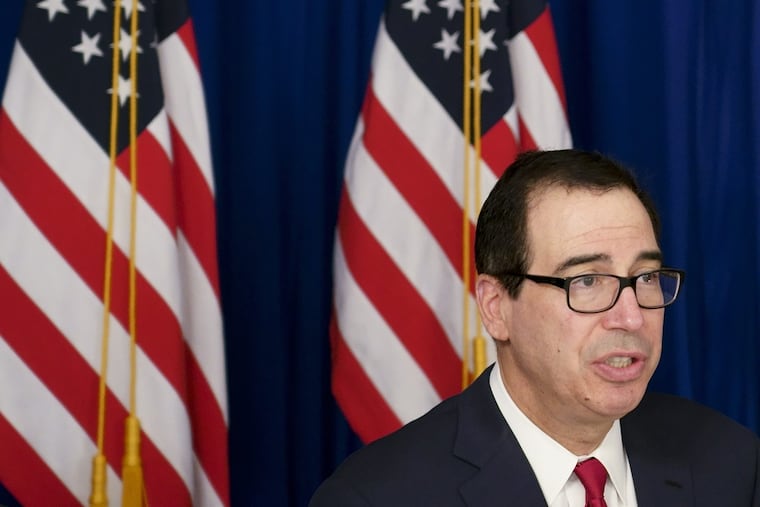Big business buys back billions of debt
With rates rising and the outlook unsure, some big companies say it's a good time to pay down debt.

Two of the biggest corporate borrowers in America are preparing to buy back billions of their own debt as they reorganize operations, in an environment that includes reduced federal tax deductions on interest payments, and uncertain demand for industrial products amid the U.S. trade fight with China.
In Wilmington, the DuPont Co., which is scheduled to be spun off by DowDuPont in the spring, said Tuesday it is offering to buy back $6.2 billion of its debt, at premiums of $30 per $1,000 outstanding, on a range of notes that had been scheduled to mature between next March and 2038. After rising in morning trading, DowDuPont closed at $57.48, down 0.4 percent.
DowDuPont expects to pay for the DuPont Co. bonds and other debt in part by borrowing up to $17 billion for DuPont and its two other successor companies. Then the company plans to pay down $2 billion in debt at the planned Dow Chemical spin-off, reduce debt by $10 billion at Wilmington-based Corteva Agriscience (Corteva is also taking on the companies' $6 billion in pension obligations), and finance up to $3 billion in share buybacks. When that's done, Dow and DuPont will still owe many billions.
"This is a process, not a single event," says DuPont spokesperson Gregg Schmidt. S&P late Tuesday rated this unsecured borrowing as A-, medium grade.
In New York, General Electric Corp. said Monday it will sell more assets "with urgency" to reduce the potentially crippling debt load its bosses took on when it was a larger, more profitable company. The company lost $23 billion in the three months ended Sept. 30, cut its dividend, and acknowledged a government probe of its accounting. GE shares, which had lost three-quarters of their value since January, rose 7.7 percent Tuesday to close at $8.60.
GE bonds have been trading "far below par," and the cost of GE credit-default swaps — investor insurance against bond defaults — has risen, Reuters reported. Disappointing investors, GE last year collected less than $3 billion in the sale of its locomotive business, which has plants in Grove City, Pa., and Texas, to a partnership managed by Wabtec Corp. GE CEO Larry Culp has said sales of GE's money-losing power unit and its aviation unit are less likely.
"These moves make sense, and are likely to continue if market conditions don't change," said Andrew Beckman, head of liquid credit at FS Investments in Philadelphia. "Tax cuts have created additional cash flow for many large, multinational US companies, limitations on interest expense deductions have reduced the attractiveness of maintaining certain debt levels, and trade tensions have caused management teams to pause on reinvesting in their businesses." Big companies have plowed an estimated $1 trillion in tax savings and profits into repurchasing their own shares, while investing relatively modest sums in hiring and expansion.
The two industrial powerhouse companies, which have been selling units and cutting costs under shareholder pressure, are buying back their debt as the U.S. Treasury seeks to sell a lot more government debt into world markets.
The government has borrowed an additional $1.2 trillion since President Trump signed Republicans' extensive tax cuts at the end of 2017, despite Treasury Secretary Steve Mnuchin's assurance the tax reform "will pay for itself" over the next 10 years (see Fox News video, especially at 2:30), and expects expanded borrowing next year.
"Who is going to buy $1.3 trillion in new U.S. government debt?" Matt Topley, chief investment officer at Fortis Advisors in King of Prussia, asked clients in his newsletter Tuesday. Topley noted that Asian investors — including South Korea and Singapore, as well as China and Japan — have been buying less U.S. government debt recently, just half of last year's rate even as the supply of Treasury bills and notes grows. U.S. investors and buyers elsewhere in the world are still buying, he added.
These companies will use proceeds to lower debt and reduce their interest-to-income ratios, which "reduces operating profit margin risk and, by extension, improves return on equity" investment, says Howard A. Trauger, president of the Bond Club of Philadelphia and managing director at Carnegie Investment Counsel.
With Fed rates rising and inflation uncertain in the face of the tariff war, borrowing "can be done at a lower future-cost today," Trauger added. "Otherwise, the debt continues to be a drag on their ratings and operating options."
The government's benchmark rate, used to set the higher rates charged to borrowers, has risen from less than 0.5 percent in 2015, to over 2 percent today, with another hike expected next month.
Rising interest rates reduce corporate demand for debt, noted commercial banking analyst Frederick Cannon in a recent report to clients of Keefe, Bruyette & Woods in New York. U.S. corporations as a group "have a record level of debt already, higher interest rates reduce demand, and the tax cuts improved corporate profitability but had a limited impact on consumer demand," Cannon added.
Banks' commercial and industrial loans reported to the FDIC "did move up in the first half of 2018, but growth rates have recently stalled. And, commercial real estate lending is on a downward trajectory."
After a decade of near-record low interest rates, U.S. private debt remains high and rising. "Nonfinancial corporate debt is now approaching 50 percent of Gross Domestic Product," Cannon added, citing Federal Reserve data. Small banks are still recording rising loan volume, but Cannon expects that to "stall out" soon.